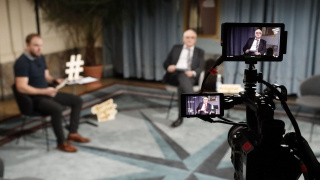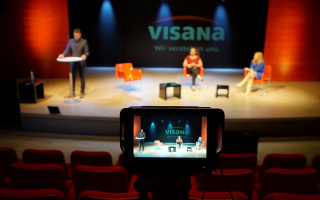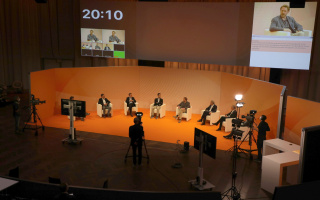An event in times of COVID? Virtual and hybrid events are the solution.
Professional infrastructure, short distances, and smooth interaction between the competent experts – in Bern, event organizers are presented with the perfect conditions for realizing safe and (cost) efficient digital events. The key success factors are collaboration and well-coordinated processes between hosts, organizers and other partners. Many venues already have streaming studios that are equipped and ready for use so virtual meetings can be set up quickly and easily.Professional infrastructure, short distances, and smooth interaction between the competent experts – in Bern, event organizers are presented with the perfect conditions for realizing safe and (cost) efficient digital events. The key success factors are collaboration and well-coordinated processes between hosts, organizers and other partners. Many venues already have streaming studios that are equipped and ready for use so virtual meetings can be set up quickly and easily.
Introducing and including digital solutions has become an important part of planning and realizing meetings. The possibility of participating from anywhere in the world means that you can reach more people and ensure optimal transfer of knowledge. In order to increase the (digital) participants’ opportunities to network and to make the event interactive for everyone, tools such as the chat, live surveys, virtual coffee breaks or even independent breakout sessions can be incorporated.
The three reference events as well as an interview with a technology provider will give you in-depth insight into the variety of solutions and options for virtual and hybrid events.
Are you planning a virtual event and convinced by our examples? Then we look forward to hearing from you: we at the Bern Convention Bureau offer comprehensive consulting, make an initial assessment free of charge according to your individual requirements, and collect offers from the respective partners.
Contact
Feel free to contact us – we are here to help. T. 031 328 12 60
-
 Bern Convention BureauMischa NiederlHead of Bern Convention Bureau
Bern Convention BureauMischa NiederlHead of Bern Convention Bureau -
 Bern Convention BureauStéphanie MeyerTeamleader Operations Management MICE
Bern Convention BureauStéphanie MeyerTeamleader Operations Management MICE -
 Bern Convention BureauFlorence ClémentOperating Manager MICE
Bern Convention BureauFlorence ClémentOperating Manager MICE -
 Bern Convention BureauLaure SiffertOperating Manager MICE
Bern Convention BureauLaure SiffertOperating Manager MICE -
 Bern Convention BureauMirjam SutterApprentice
Bern Convention BureauMirjam SutterApprentice
Best practice examples
Draw inspiration from these three best-practice events.
Locations
The following locations are perfectly equipped for hosting digital and hybrid meetings:
-
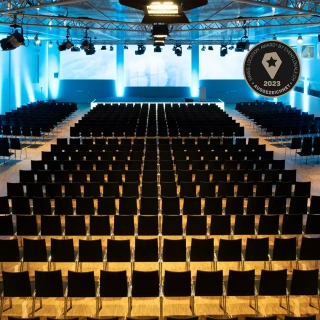 BERNEXPOThe countless ways to combine inside and outside spaces make BERNEXPO the ideal location for any event.Venue FinderBERNEXPOMore
BERNEXPOThe countless ways to combine inside and outside spaces make BERNEXPO the ideal location for any event.Venue FinderBERNEXPOMore -
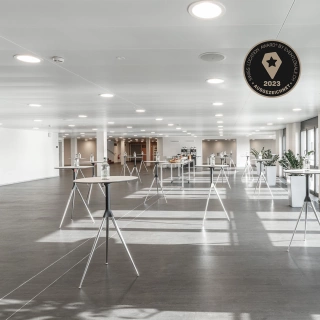 Kursaal Bern / Swissôtel Kursaal Bern****SKursaal Bern has Bern's largest selection of convention venues – including a streaming studio, suitable for on-site, hybrid, and digital events.Venue FinderKursaal Bern / Swissôtel Kursaal Bern****SMore
Kursaal Bern / Swissôtel Kursaal Bern****SKursaal Bern has Bern's largest selection of convention venues – including a streaming studio, suitable for on-site, hybrid, and digital events.Venue FinderKursaal Bern / Swissôtel Kursaal Bern****SMore -
 Stadion WankdorfFrom roaring soccer stadium to multi-functional event and convention centre: with its unique stadium atmosphere, Stadion Wankdorf turns every event into a one-of-a-kind experience.Venue FinderStadion WankdorfMore
Stadion WankdorfFrom roaring soccer stadium to multi-functional event and convention centre: with its unique stadium atmosphere, Stadion Wankdorf turns every event into a one-of-a-kind experience.Venue FinderStadion WankdorfMore -
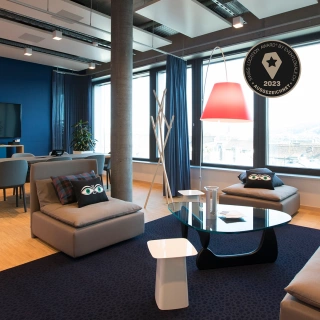 Welle7 WorkspaceCentral, urban and right in the middle of the action – Welle7’s creative environment inspires you, enables flexible working and combines business with leisure under one roof.Venue FinderWelle7 WorkspaceMore
Welle7 WorkspaceCentral, urban and right in the middle of the action – Welle7’s creative environment inspires you, enables flexible working and combines business with leisure under one roof.Venue FinderWelle7 WorkspaceMore -
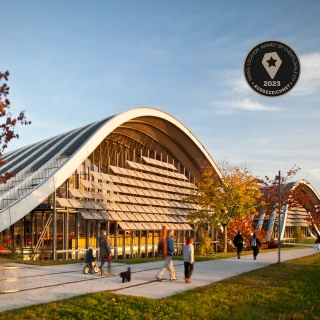 Zentrum Paul KleeEvents held at this vibrant art and culture center give free rein to participants’ creativity. In addition to the world’s most extensive Klee collection, the center also offers seminar and banquet facilities and an auditorium for conventions and concerts.Venue FinderZentrum Paul KleeMore
Zentrum Paul KleeEvents held at this vibrant art and culture center give free rein to participants’ creativity. In addition to the world’s most extensive Klee collection, the center also offers seminar and banquet facilities and an auditorium for conventions and concerts.Venue FinderZentrum Paul KleeMore -
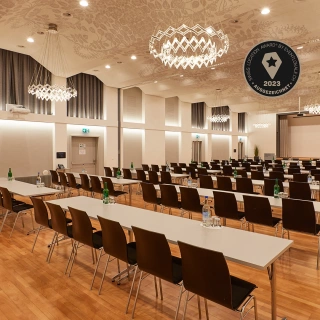 Congress Center Kreuz Bern***The Congress Center Kreuz is centrally located in a vibrant area of downtown Bern. It is one of the largest mid-range congress hotels in Switzerland.Venue FinderCongress Center Kreuz Bern***More
Congress Center Kreuz Bern***The Congress Center Kreuz is centrally located in a vibrant area of downtown Bern. It is one of the largest mid-range congress hotels in Switzerland.Venue FinderCongress Center Kreuz Bern***More -
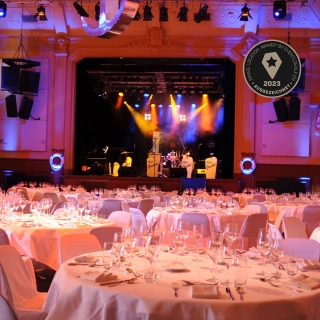 Bierhübeli BernGrand on the outside, modern on the inside: Bierhübeli offers the perfect space and the perfect catering for any event.Venue FinderBierhübeli BernMore
Bierhübeli BernGrand on the outside, modern on the inside: Bierhübeli offers the perfect space and the perfect catering for any event.Venue FinderBierhübeli BernMore
We are happy to help you choose the right partner for your event.
Interview with Benjamin Blaser
Mr. Blaser, what were the most important lessons you learned as a partner in the realization of virtual and hybrid events?
Not to underestimate the complexity of a successful virtual or hybrid event. This type of event offers a large variety of options when it comes to configuration and implementation – however, due to the ever-changing technology and the advancement of the platforms, it is not always easy to keep up. Therefore, solid, in-depth planning of the event is paramount. Many organizations are hesitant to utilize new technologies that they don’t know, which is why it is important to schedule test runs.
Are there any experiences and learnings that have already directly influenced your day-to-day work?
When we started doing virtual and hybrid events in the spring, we were able to learn from the experiences made with classic livestreams. So we didn’t have to learn everything from the ground up. What has changed, however, are the expectations and demands concerning moving the event into the digital space, the types of interactions, and the partial replacement of networking possibilities. There are hundreds of tools and providers and we learn more with every project we do and every month that goes by. Some virtual event platforms, for example, made a good first impression but were not suitable at all in practice. Something else I have learned in the past months is that it pays off to invest time when conceptualizing the event. Merely copy-pasting the physical event into the digital world is not worth it. You have to find out which format is interesting and at the same time entertaining for those participating from home. Let’s put it this way: I don’t think many people want to sit at home and watch an entire linear 10-hour convention on a stage, without breaks, breakout sessions or other possibilities of interacting. We are generally noticing that the attention span is short when in front of a screen, which is why we recommend limiting the items on the agenda to a maximum of 30 minutes each.
What are the reactions of the involved persons and parties – is there a noticeable tendency toward the new digital event solutions?
We are noticing a clear tendency. But let me elaborate. In the spring of 2020, organizations fell into a state of paralysis when all types of events had to be cancelled or postponed. We thought that, come summer, everything would be back to how it was before. It wasn’t until summer 2020 was rapidly approaching and the (event) world was still not back to normal that organizations realized that their events would not be the same again, at least in the medium term. And ever since that time, most organizations have been trying to make their events hybrid or completely virtual. In my opinion, hybrid will be the prevailing solution in the future, with a limited number of participants on-site and a complementing digital component. This format will also endure in post-COVID times as it has many advantages, such as lower CO2 emissions, fewer costs, and less travel time for the participants, for example. However, people miss the networking aspect, which is why we are convinced that entirely virtual event formats will be the exception.
What would you personally recommend to potential organizers of virtual and hybrid events when planning and conceptualizing?
Our recommendation is to really put enough thought into the conceptualization of the ideal format. Nowadays, nobody wants to passively stare into a screen all day. Split up your event and have it on several days rather than one, and include things like networking opportunities, playful elements, breakout sessions or surveys. Do everything you can to keep the virtual audience interested and happy. One of the big advantages of virtual and hybrid events is sustainability. We recommend providing the entire programme on demand after the event and using short excerpts from it as content on your own channels. At a professionally produced hybrid or virtual event, a lot of good content is generated, usually enough to last for an entire year on social media. A virtual event can essentially be implemented in any meeting room or similar space. When planning the event, make sure to invest enough resources for studio design and the look and feel of the setting: just putting up a roll-up display is hardly innovative. If the event is to take place in a hybrid format, we have the perfect event venues here in Bern. All of the larger venues have specialized in these event forms by now and some even offer their own complete packages and solutions.
Looking at the next weeks and months, is there a tendency when it comes to topics?
That is difficult to say because we are moving in such a fast-paced environment. But in the next few months, the focus will likely increasingly be on the best possible usability of virtual and hybrid events. There have been many good events in these formats, nevertheless, the user experience was seldom attractive. That’s why that will be our focus for the coming months. The issue of marketing and monetization of these event formats will also become more important in the future, as there is still room for improvement in those areas. With the right marketing strategy, native inclusion of sponsor presence in these events, video recordings on demand, streamlined processes in the background and the right pricing, there are definitely possibilities.
Do you think the demand for virtual and hybrid events will decrease or even disappear completely after COVID-19?
No, I don’t think so. We have a lot of conversations with organizers of virtual and hybrid events and they all say the same thing: everybody is desperately waiting for physical events to return, but also agrees that a complementing virtual component is very valuable. We are convinced that hybrid event formats – provided they are set up correctly – will prevail in the medium term and, thanks to that, organizers will be able to reach a larger audience. It is also attractive financially. The future for completely virtual events is a little less bright, in our opinion. They will surely still be around in the future, but they will be exceptions. The desire to meet in person again will be huge after this past year.
And let me conclude by saying this: In my personal opinion, there are not many cities in the world where it’s easier to organize virtual and hybrid events than in Bern. We have great venues, short distances, a lot of know-how in this field, and can quickly bring together the right players for a successful implementation.
Example of a successful implementation by the parliamentary services

